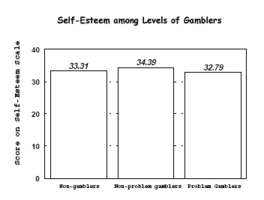Competing hypotheses exist regarding the self-esteem of gamblers. Some observers believe that problem gambling is an addictive behavior preceded by a state of low self-esteem. Others believe some gamblers’ self-esteem is high due to their perceived expertise in gambling activities or inflated sense of skill, influence, and ego. It is also possible that gamblers maintain a high self-esteem until they begin gambling problematically, at which time the adverse consequences of that behavior lowers their self-esteem. A recent prevalence study which randomly sampled 1,551 adults in Georgia empirically examined the issue of gamblers’ self-esteem. Researchers measured self-esteem in this study with the Rosenberg Self-esteem Scale, which includes 10 items on which respondents report their level of agreement on a 4-point scale. Respondents were classified into 3 groups for comparison: 1) non-gamblers (no lifetime participation in gambling), 2) non-problem gamblers (gamblers with SOGS score of 2 or lower), and 3) problem gamblers (gamblers with SOGS score of 3 or higher). Non-problem gamblers had significantly higher self-esteem than non-gamblers and problem gamblers. This significant finding may be due to inflated statistical power (e.g., between .94 and .99 for small and moderate effect sizes respectively); high levels of power can identify very small group differences as statistically significant. However, these differences may not be clinically meaningful. In addition, this study could not identify a temporal relationship between self-esteem and problem gambling; that is, does lower self-esteem lead to problem gambling, does problem gambling lead to lower self-esteem, or does another factor influence both? Furthermore, the difference between non-gamblers and non-problem gamblers remains unexplained. Although the authors suggest that the lives of the problem gamblers in this sample apart from their gambling involvement built the foundation for lower self-esteem, longitudinal cohort studies are necessary to answer these questions with precision and determine the relationships between self-esteem and problem gambling.
Source: Volberg, R.A., Reitzes, D.C., & Boles, J. (1997). Exploring the links between gambling, problem gambling, and self-esteem. Deviant Behavior: An Interdisciplinary Journal, 18, 321-342.





